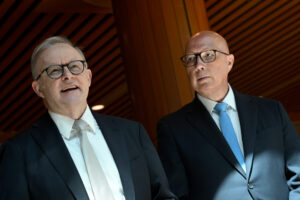by Richard Denniss, Chief Economist at The Australia Institute.
[Originally published in the Guardian Australia 03.10.18]
Greed is good. Or so said Michael Douglas’ character Gordon Gekko in the 1980s hit film Wall Street. Gekko went further, stating “Greed, in all of its forms; greed for life, for money, for love, knowledge has marked the upward surge of mankind”.’
But greed also leads Australian banks to steal from dead people.
In handing down his interim report last week at the financial services royal commission, the Honourable Kenneth Hayne was damning in his criticism of the behaviour of Australian bankers. It wasn’t a lack of laws, guidelines or codes of conduct that led to the richest banks stealing from the poorest Australians, the commissioner argued, it was simply greed.
Hollywood often makes bank robbers the heroes of its films, but until Gordon Gekko came along, the bank robber was always the underdog. Since the 1980s when the neoliberal value of self-interest replaced the traditional value of self-sacrifice, films, bankers and even our elected representatives have been telling us not only is it OK for rich bankers to rob poor people, it is laudable.
Australia’s big four banks are among the most profitable in the world. In fact, the profits of the big four banks account for 2.4% of gross domestic product. Think about that: of every $100 produced in Australia, $2.40 goes to the shareholders of the big four banks.
While the scale of illegality and unethical behaviour in the Australian financial sector might be news to many Australians, the scale of fee-gouging, profiteering and the terrible treatment of customers should be no surprise to our regulators or politicians.
Organisations like the Australia Institute, the Consumer Action Law Centre and the Public Interest Advocacy Centre have for more than a decade tried to draw attention to the outrageous amounts of money Australians must pay to withdraw money from an ATM, use a credit card, or have their compulsory retirement savings managed on their behalf.
Not only has the finance industry fought tooth and nail to prevent the introduction of stronger laws that protect consumers from greed, but successive governments, Treasury secretaries and financial regulators have fallen for the banks’ argument that “light touch” regulation is in Australia’s best interests. Yeah, right.
The $2.7tn of Australian citizens’ money tied up in superannuation is often used as evidence of the strength and competitiveness of the Australian finance sector but, of course, nothing could be further from the truth. The only reason the Australian finance sector manages one of the largest pools of retirement savings in the world is because Australian consumers have no say in it.
Nearly all workers are forced to contribute 9.5% of their income to superannuation every week, whether they like it or not. And having been forced to spend up big on retirement savings, they are then forced to pay some of the highest fees in the world to have their “nest egg” managed. While it is true that not-for-profit industry funds charge much lower fees than the for-profit funds owned by the big banks, even the “low fees” charged by industry funds are much higher than the fees charged to manage money in most other counties.
The enormous profitability of the Australian finance sector is built on a spectacular contradiction in the way the system is regulated. On the one hand, legislation forces Australians to give compulsory super contributions to the finance sector to manage. But at the same time, Australian policy makers and regulators have pretended that the same workers who can’t be trusted to decide how much to save, can, however, be trusted to decide which financial institutions will do the best job of managing those savings.
Put simply, the Australian finance sector is based on the very worst combination of government dictat when it comes to the amount that must be saved and neoliberal laissez-faire on how those savings are to be managed. And as the royal commission has shown, were a stressed and busy worker to seek out a financial planner to help them avoid the rip-offs, there is a good chance that financial planner would rip them off too.
The profitability of the Australian finance sector is built on high fees, useless products, compulsory purchases, weak regulation and even weaker regulators. There is no technological reason the profit margin of Australian banks is so high – the explanations are entirely cultural. As Hayne has shown, the culture of the Australian finance sector is one of greedy suppliers and weak regulators.
The neoliberal idea that “free markets” would deliver more for individual consumers and the economy than “red tape and regulation” was popularised by films like Wall Street, and embraced wholeheartedly by proponents as diverse as Paul Keating and the Institute of Public Affairs. But the Financial Services Royal Commission has provided clear proof of what the sceptics have been arguing for decades: Greed isn’t good for anyone – except the greedy.
It’s often said that you can’t legislate against stupidity, and Hayne is now suggesting that you can’t legislate against greed either. But while criminalising greed is beyond the constitutional power of the commonwealth, there is nothing to stop our politicians, or our regulators, from being as focused on preventing malfeasance in the banking sector as they are when it comes to welfare overpayments and the sabotage of strawberries.
Richard Denniss is the chief economist for the Australia Institute. His Quarterly Essay, Dead Right: How Neoliberalism ate itself and what comes next, is available now
Between the Lines Newsletter
The biggest stories and the best analysis from the team at the Australia Institute, delivered to your inbox every fortnight.
You might also like
5 ways and 63 billion reasons to improve Australia’s tax system
With a federal election just around the corner, new analysis from The Australia Institute reveals 63 billion reasons why our next Parliament should improve the nation’s tax system.
Five reasons why young Australians should be pissed off
1. Uni graduates pay more in HECS than the gas industry pays in PPRT University used to be free but is now more expensive than ever. After graduating with an arts degree a young Australian will now repay the government around $50,000. Meanwhile, Australia is one of the world’s largest gas exporters, but multinational gas
Do you have $3 million in super? Me neither. These changes will actually help you
Labor’s planned reforms to superannuation tax concessions may be being reported as “controversial” but the fact is they are popular.


